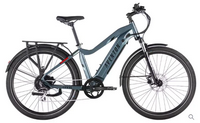Introduction
In recent years, there has been a growing trend towards eco-friendly modes of transportation, driven by concerns about environmental sustainability and the desire for healthier lifestyles. One such mode of transport gaining popularity is the electric commuter bike. This article explores the benefits of electric commuter bikes for sustainable travel and how they are revolutionizing the way people commute in urban areas.
The Rise of Electric Commuter Bikes
Electric commuter bikes, also known as e-bikes, have seen a surge in popularity due to their ability to provide efficient and environmentally friendly transportation. Unlike traditional bicycles, e-bikes are equipped with an electric motor that assists riders in pedaling, making it easier to navigate urban landscapes and conquer hills without breaking a sweat. The rising cost of fuel and growing concerns about air pollution have contributed to the increasing demand for electric commuter bikes as a viable alternative to cars and public transportation.
Environmental Benefits
One of the primary advantages of electric commuter bikes is their positive impact on the environment. By choosing to ride an e-bike instead of driving a car, individuals can significantly reduce their carbon footprint and contribute to mitigating climate change. E-bikes produce zero emissions during operation, making them an eco-friendly mode of transportation that helps improve air quality and reduce noise pollution in urban areas.
Health and Fitness
In addition to their environmental benefits, electric commuter bike offer numerous health benefits for riders. While riding an e-bike requires less physical exertion than traditional cycling, it still provides an excellent form of exercise. Commuting by e-bike allows individuals to incorporate physical activity into their daily routines, leading to improved cardiovascular health, increased muscle strength, and enhanced overall fitness levels. Moreover, riding an electric bike can help individuals maintain a healthy weight and reduce the risk of chronic diseases such as obesity and heart disease.
Cost-Effectiveness
Another advantage of electric commuter bikes is their cost-effectiveness compared to other modes of transportation. While the initial investment in an e-bike may seem significant, it is offset by the savings in fuel, parking fees, and maintenance costs associated with owning a car. E-bikes are also more affordable to operate and maintain than traditional bicycles, making them an attractive option for budget-conscious commuters looking to save money on transportation expenses.
Convenience and Accessibility
Electric commuter bikes offer unparalleled convenience and accessibility for riders. With the assistance of an electric motor, cyclists can travel longer distances and tackle steep inclines with ease, making e-bikes an ideal mode of transportation for commuters navigating hilly terrain or covering extended distances. Additionally, electric bikes can be easily charged at home or work using a standard electrical outlet, eliminating the need for specialized charging stations and allowing riders to recharge their batteries wherever they go.
Conclusion
In conclusion, electric commuter bikes represent a sustainable and practical solution for modern urban transportation. With their environmental benefits, positive impact on health and fitness, cost-effectiveness, and convenience, e-bikes offer a compelling alternative to traditional modes of transportation such as cars and public transit. By embracing electric commuter bikes, individuals can reduce their carbon footprint, improve their health, save money, and enjoy a more convenient and enjoyable commuting experience. As cities continue to invest in cycling infrastructure and promote sustainable transportation options, electric commuter bikes are poised to play an increasingly significant role in shaping the future of urban mobility.





Comments